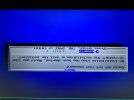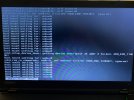Also be advised, the above installerconfig setup in this form won't install a 13.0-RELEASE bootable system on UEFI because of missing efi boot loader.
You are 100% about not working with UEFI. I am not quite sure what I am missing. Here is my complete installerconfig file.
I apologize not to elaborate the issue and express myself clearer .
You are missing nothing. It's a bug in 13.0-RELEASE, affecting automatic installation of ZFS on UEFI.
As said before,
bsdinstall(8) does not install the efi boot loader (in the right place).
In detail,
loader.efi (or
bootx64.efi, same loader, different name) is installed in a automatic installation in the new system under
/boot/efi/efi/boot/bootx64.efi and
/boot/efi/efi/freebsd/loader.efi.
/boot/efi/ on the other hand is a directory under
/ of dataset zroot/ROOT/default, on partition ada0p4, the freebsd-zfs partiton.
The place where the efi loader should be installed is on a FAT formatted, separate partition, ada0p1, mounted under
/boot/efi, but that partition remains empty after the installation finishes.
And second,
bsdinstall(8) doesn't create a EFI boot variable in UEFI to boot the system from.
The new system boots fine after creating appropriate directories and copy
/boot/loader.efi to
/boot/efi/boot/bootx64.efi, and creating a boot variable with
efibootmgr(8).
This could be done as a workaround in the setup shell script part of
/etc/installerconfig.
I'm not sure if it's the same bug discussed and reported below or a new one. I haven't tested 13.0-STABEL:
-
Unattended install on FreeBSD13 with zfs/efi
-
PR 255824 - Unattended install with UEFI and ZFS fails
It doesn't help to replace directory
/usr/libexec/bsdinstall on 13.0-RELEASE installer media with the one from 13.0-STABLE. The installation terminates with a error message window popping up, the new system remains mounted, no UEFI boot variable is created, system doesn't reboot automatically.
Conclusion, automatic installation of 13.0-RELEASE is buggy at the moment. Maybe it's corrected in 13.1-RELEASE, depending on if it's the the same bug mentioned earlier.



